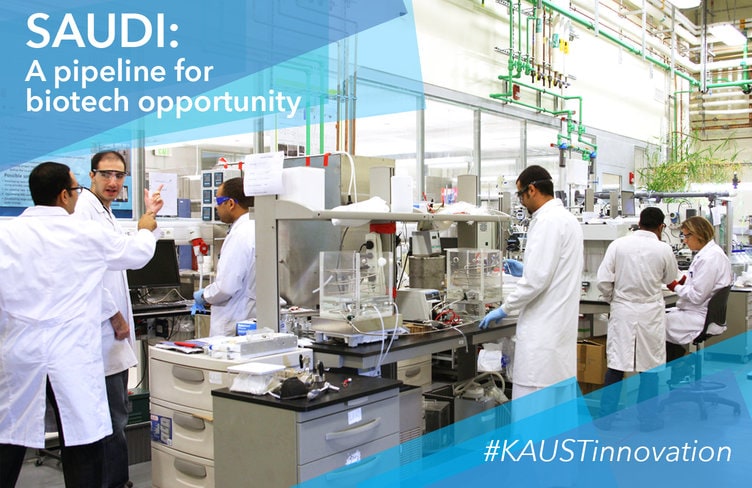With an open economy and a strong commitment to economic diversification and building a knowledge-based society, it is a good choice to do business and research in Saudi Arabia, particularly in the healthcare and biotechnology sector.
Saudi Arabia is a G20 member—one of the world’s 20 major economies. Its economy accounts for approximately 38 percent of the Middle East’s entire gross domestic product. Over the past half-century, Saudi Arabia has had the third fastest growing economy in the world, just behind China and South Korea.
The Kingdom is a source of regional stability, ranks 4th in the world for macroeconomic stability and has a young and technology-savvy population. With a continuously expanding domestic economy and a population that grows nearly 3.5 percent a year, it is a nation of young consumers with strong buying power.
A Pipeline of Opportunities in the Kingdom
Other advantages include an abundance of natural resources, incentives for foreign companies establishing themselves in the country and a healthcare business environment that allows for 100 percent foreign ownership. With the Kingdom spending approximately $US 43 billion on health and social care annually, there are tremendous opportunities to invest in the localization of this sector, including developing medical products, pharmaceuticals and a variety of medical services.
Recently, the Saudi Arabian General Investment Authority (SAGIA) announced a new licensing program tailored for innovators, talented local and overseas students and researchers who are interested in implementing their ideas, patent rights and business startups across the Kingdom. It has been implemented in coordination with the King Abdullah University of Science and Technology (KAUST).
An Emerging Ecosystem for Research and Commercialization
KAUST was established in 2009 by Saudi Arabia’s late King Abdullah. The University aspires to be a destination for scientific and technological education and research. Its research and commercialization efforts in sectors such as biotechnology are a key catalyst for the Kingdom’s economic diversification.
Similar to many global collaboration models, industry and academia collaborate side-by-side in Saudi Arabia to pursue technological discoveries. Saudi Arabian institutions are notably unique in developing collaboration models that promote innovation through strategically connected programs with some of the most advanced facilities and scientific equipment in the world.
For example, the KAUST Proof-of-Concept (POC) Funding Program enables faculty, students, researchers, entrepreneurs, and partners to initiate proof of concept studies without having to raise additional capital to purchase basic and special lab equipment or to find manufacturing space. This collaboration is leading to promising research and commercialization in a number of sectors, notably including biotechnology and material and chemical science.
A Trail-blazer for Biotech Trends
One particular example in wearable biosensors has led to advances in easy-to-wear ‘smart’ bandages. Researchers at KAUST have developed an easy-to-wear bandage that responds in near real-time to physiological conditions of chronic wounds. This technology consists of two parts: 1) a reusable, multicomponent sensor; and 2) a traditional disposable bandage with printed electronics that forms the interface between the two components. The combined technology monitors bleeding patterns, detects early signs of infection and tracks pressure.
This smart bandage has embedded wireless technology that sends the medical readings to health providers and potentially even personal health record systems. It also features low-cost production bio-compatibility, is comfortable to wear, and provides patient and medical practitioners with a next-generation treatment option.
The technology could significantly reduce health care spending by allowing patients to monitor their chronic wounds as outpatients while having the bandage send multi-day medical readings to doctors and nurses for tracking purposes and to determine if further action is needed.
In another example, a KAUST post-doctorate researcher has enhanced visualization technology turning 2-D scans into 3-D models. This work could have exceptional potential in augmenting current medical imaging platforms in the med-tech and health-sciences sectors by allowing physicians to view multidimensional portraits of clinical scans previously limited by linear scanning. The value could be realized in enabling physicians to visualize tissue and identify potential tumors at earlier stages, particularly those that are notoriously difficult such as tumors in the brain.
Bold Experimentation in World-Class Facilities
In addition to the research, biotechnology and pharmaceutical companies from around the world can take advantage of an innovation ecosystem at KAUST that allows them to scale up their fine chemicals, including pharmaceutical active ingredients and organic based products, and engage in product development, training and other technical work.
In an era when many institutions worldwide face financial constraints, institutions in Saudi Arabia such as KAUST are providing innovators in biotechnology with a direct interface to collaborate, innovate and pursue bold experimentation with high potential outcomes.
This opportunity provides innovators in academia, scientist-entrepreneurs, and corporate institutions that specialize in new venture creation and innovation investment with greater ability to translate scientific breakthroughs that ultimately provide improvements in healthcare as the most promising innovations arise and emerge towards commercialization.
2016 BIO International Convention
From June 6 to 9, 2016, there will be over 15,000 biotechnology and pharma leaders attending the BIO International Convention (BIO) in San Francisco. BIO covers a wide spectrum of life science and application areas including drug discovery, biomanufacturing, genomics, biofuels, nanotechnology and cell therapy. More information on this event is available here.

